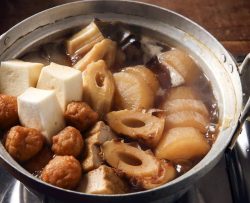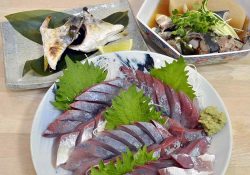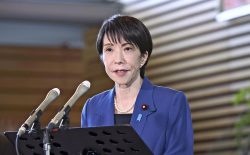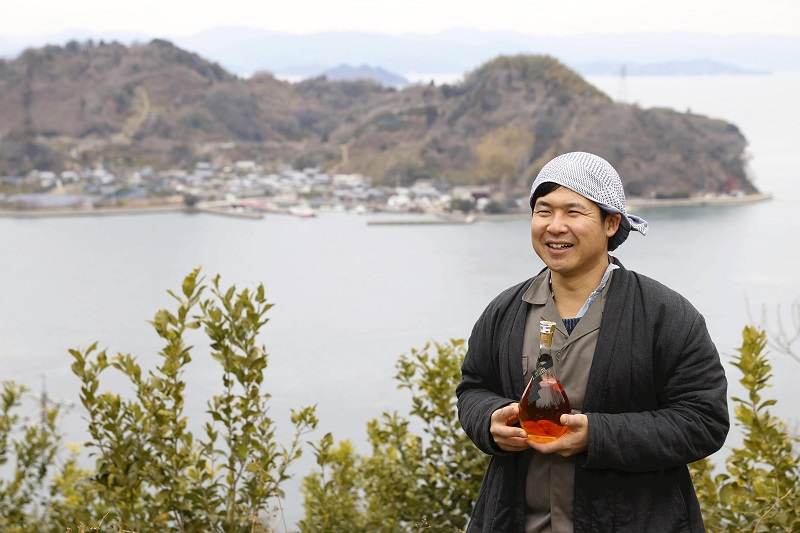
Naorai Inc. President Koichiro Miyake holds a bottle of his company’s aged, distilled beverage Kohaku Jo-Chu in Kure, Hiroshima Prefecture.
15:46 JST, June 28, 2022
KURE, Hiroshima — With the number of domestic sake breweries in decline across Japan, a company in Hiroshima Prefecture has developed a novel drink to help revive the industry.
Kure-based Naorai Inc. uses a patented technique to make a distilled beverage from sake that it brands as Jo-Chu, Purified Spirit.
Although similar in name to shochu — the Japanese spirit distilled from ingredients such as barley, brown sugar, rice and sweet potatoes — Naorai places its Jo-Chu in a category of its own.
“I wanted to develop a drink similar to whisky that becomes more valuable the longer it takes to mature,” said Naorai’s 38-year-old President Koichiro Miyake.
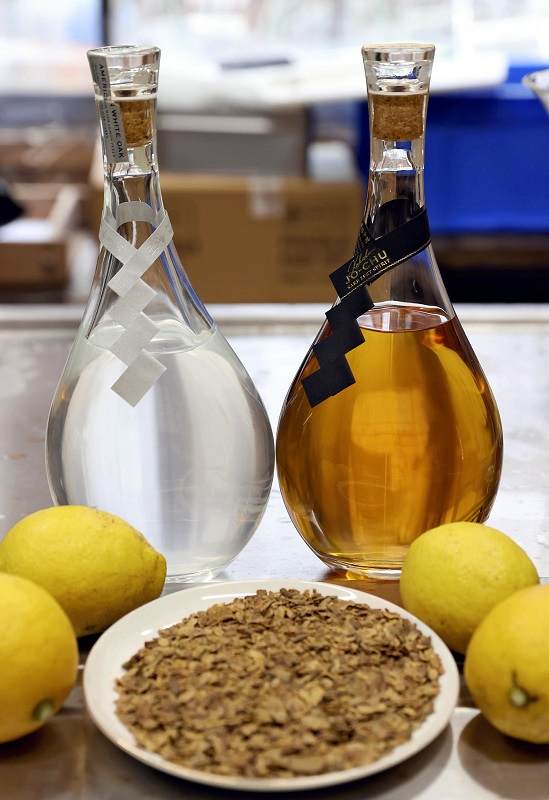
Naorai’s Jo-Chu, left, and Kohaku Jo-Chu, which is flavored with the peels of organic lemons it grows on Osaki-Shimojima island in the Seto Inland Sea
The company rented an unused sake brewery in the town of Jinsekikogen that belongs to a 160-year-old sake brewer that stopped production about seven years earlier. Naorai partnered with five breweries in Hiroshima and Shimane prefectures, using their sake to make its regular Jo-Chu and Kohaku Jo-Chu, which is aged in wooden barrels and flavored with lemon peel from lemons grown in the Seto Inland Sea.
About 10% of the sake made by the Yamaoka Sake Brewery in Miyoshi, Hiroshima Prefecture, goes to Naorai for the production of Jo-Chu.
“It would be great if the appeal of sake is conveyed through new ways of enjoying the beverage,” said Katsumi Yamaoka, the brewery’s fourth-generation president.
In fiscal 2019, there were 1,130 sake breweries operating, half the number in business 30 years earlier, according to National Tax Agency data. Small and midsize breweries account for 99% of the total, with about half of them in the red or barely making any profit.
“I hope to work with more companies to boost the industry,” Miyake said.
Naorai has its headquarters in the Seto Inland Sea on Mikadoshima island, which has a population of about 20. The company also has a base on neighboring Osaki-Shimojima island, where it cultivates and processes lemons it grows without the use of chemicals with the help of a local organic farmer. The company hopes this facet will also attract people to the island.
Miyake, whose great-grandfather founded a sake brewery in Kure, was exposed to the industry from an early age. He was motivated to promote sake overseas amid the fall in domestic sales and the increase in the number of breweries going out of business. Since 2011, he has also been selling sake in Shanghai.
While freshness is vital when making good sake, Miyake came up with the idea of a new beverage based on whisky. He worked with an expert to develop a low-temperature distillation process, from 35 C to 40 C, to avoid spoiling the aromas and flavors of the spirit. Miyake patented the technique in 2019 and launched Jo-Chu in 2020.
Naorai sold about 3,000 bottles of Jo-Chu in fiscal 2021 and aims to double that figure in fiscal 2022.
“The goal is to create a business model that will help revive the sake industry in Hiroshima and then expand that model to preserve breweries and sake culture nationwide,” Miyake said. “We also want to expand the market by promoting the deliciousness of this new drink around the world.”
Top Articles in Features
-

Sapporo Snow Festival Opens with 210 Snow and Ice Sculptures at 3 Venues in Hokkaido, Features Huge Dogu
-

Tokyo’s New Record-Breaking Fountain Named ‘Tokyo Aqua Symphony’
-

Tourists Flock to Ice Dome Lodge at Resort in Hokkaido, Japan; Facility Invites Visitors to Sleep on Beds Made of Ice
-

High-Hydration Bread on the Rise, Seeing Increase in Specialty Shops, Recipe Searches
-
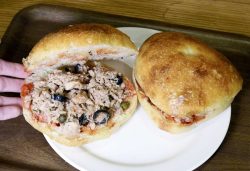
Maltese Pavilion’s Famous Ftira Bread Now Available in Osaka; Loaves Became Popular during 2025 Osaka-Kansai Expo
JN ACCESS RANKING
-

Japan Institute to Use Domestic Commercial Optical Lattice Clock to Set Japan Standard Time
-

Israeli Ambassador to Japan Speaks about Japan’s Role in the Reconstruction of Gaza
-

Man Infected with Measles May Have Come in Contact with Many People in Tokyo, Went to Store, Restaurant Around When Symptoms Emerged
-

Prudential Life Insurance Plans to Fully Compensate for Damages Caused by Fraudulent Actions Without Waiting for Third-Party Committee Review
-

Woman with Measles Visited Hospital in Tokyo Multiple Times Before Being Diagnosed with Disease


